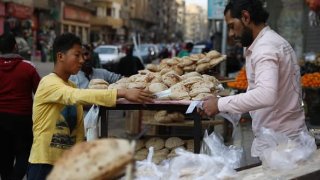
- Egypt, the Arab world's most populous country, alone imports 80% of its wheat from Ukraine and Russia.
- Lebanon, already years into a crippling debt and inflation crisis, imports 60% of its wheat from the two warring countries, which provide 80% of Tunisia's grain.
- Inflation surged to 14.8% in the MENA region in 2021, according to the International Monetary Fund.
DUBAI, United Arab Emirates — For centuries, bread has been the lifeblood of civilization. Riots and revolutions have been sparked over the availability of this basic dietary staple — and over food prices more broadly, particularly when it comes to the Middle East and North Africa.
Russia's unprovoked invasion of Ukraine now threatens a huge proportion of the wheat and grain that these countries rely on. Together, Russia and Ukraine account for roughly one-third of the world's global wheat exports, nearly 20% of its corn, and 80% of its sunflower oil — and they provide the majority of the MENA region's supply.
Wheat futures are up 30% since the invasion began in late February.
Get New England news, weather forecasts and entertainment stories to your inbox. Sign up for NECN newsletters.
Before the war, more than 95% of Ukraine's total grain, wheat and corn exports was shipped out via the Black Sea, and half of those exports went to MENA countries. That vital conduit is now shut, choking off Ukraine's maritime trade after its ports came under attack from Russia's military.

The country is now trying to export some of its produce by rail, which has enormous logistical limits, while Ukrainian farmers whose infrastructure hasn't been destroyed attempt to till their fields wearing bulletproof vests.
Money Report
Russia is the world's number one exporter of wheat, as well as – crucially – the top exporter of fertilizer. Fears of getting caught up in western sanctions on Moscow have already disrupted Russia's exports, too.
Inflation and popular unrest
All of this is turbocharging the rising inflation that's hitting the population of roughly 500 million people, particularly its poorest and those already facing high unemployment and worsening economic prospects.
"Inflation and economics, more than political freedom, are key" for the region's stability, Kamal Alam, a non-resident senior fellow at the Atlantic Council, told CNBC.
Alam pointed to the self-immolation of Mohammed Bouazizi, the young Tunisian street vendor whose act of protest set off the Arab Spring protests of 2011.
"Even the vendor who burned himself in Tunis did so because of economic indignation, not (then-Tunisian president) Ben Ali," he said. "One would argue the first and foremost reason for unrest in the Arab world is always lack of economic mobility."
Inflation surged to 14.8% in the MENA region in 2021, according to the International Monetary Fund. Already at that point, higher food prices were the main driver — making up about 60% of the increase in the region, excluding the oil-rich Gulf Cooperation Council states.
That was before the war in Ukraine began. Now, the U.N. says that food prices as of April are 34% higher than they were one year ago.
"We've got now 45 million people in 38 countries that are knocking on famine's door," David Beasley, executive director of the U.N.'s World Food Programme, told CBS in an interview last week. "And you may see a general price increase of food, let's say 38 to 40%, but in some of the very tough places, it's going to be 100, 200% like in Syria."
While countries will be looking for alternative sources for their crucial food imports, surging global inflation and potential export restrictions make switching expensive. And water scarcity across the MENA region means local agricultural production is very limited.
Warnings of riots, famine and mass migration
Egypt, the Arab world's most populous country, alone imports 80% of its wheat from Ukraine and Russia. Lebanon, already years into a crippling debt and inflation crisis, imports 60% of its wheat from the two warring countries, which provide 80% of Tunisia's grain.
Egypt "has a lot to lose from the war as its bread subsidies program reaches over half of the population and forms a pillar of the social contract that maintains stability in the most populous Arab state," said Amer Alhussein, economic development expert and advisor for the post-conflict initiative Plant for Peace.
This, he says, could explain why Egypt's wealthy Gulf allies have rushed to its aid with billions of dollars in funds for its central bank and other investments to boost its economy.
While Egypt's government can keep borrowing money, rising interest rates in major economies and weak appetite for emerging market bonds will weigh heavily on the country "and may become a sovereign risk factor and lead to a default that would have a catastrophic impact on its population," Alhussein added.
Lebanon, meanwhile, is facing "many warnings of an impending famine," Alhussein said. "The current situation could very soon develop into protests and riots like the ones that took place in 2019, but with a much more violent impact given the ever-worsening standard of life and food security in the country."
Further, higher wheat prices alone "can increase (the Middle East's) external financing needs by up to $10 billion in 2022," the IMF wrote in its latest Middle East and Central Asia Regional Economic Outlook released Wednesday. "Supply shortages originating from Russia and Ukraine can endanger food security, particularly for low-income countries, as they may also suffer from potential aid diversion."
About a quarter of Ukraine's latest pre-invasion wheat harvest is still available on markets, but that will last roughly three months, analysts say.
This fall, the WFP's Beasley warns, is when the war's impact will really hit MENA, in a crisis that he believes could trigger mass migration.

"If you think we've got hell on earth now, you just get ready," Beasley warned in an interview with Politico in March. "If we neglect northern Africa, northern Africa's coming to Europe. If we neglect the Middle East, the Middle East is coming to Europe."
Taufiq Rahim, a Dubai-based senior fellow in the international security program at think tank New America, agreed that the worst may be yet to come.
"At a time of rising inflation, increased commodity prices and supply chain gridlocks, the wider region could be in for an unprecedented economic shock this summer," Rahim told CNBC.
"A new political Pandora's box will be opened by the rising economic discontent and we will see governments under increasing pressure."






